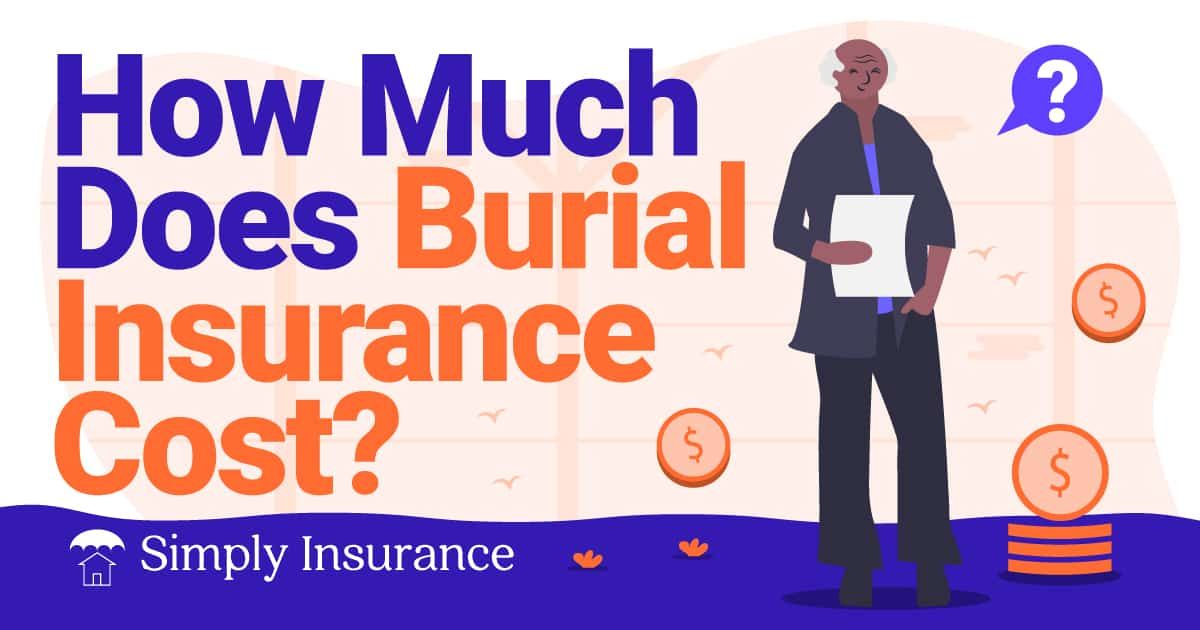I’m sure you want your family to be financially secure after your death.
When you know your options, you can help them pay for a funeral and other end-of-life costs.
This will ensure that they don't have to pay out of pocket or risk falling into debt.

Today, we’ll help you understand what burial insurance is, how different types can benefit you, and how much burial insurance costs in 2020.
How Much Does Burial Insurance Cost?
The average cost of burial insurance is about $50 per month for $10,000 in coverage. The younger you are, the less you’ll pay for your burial insurance.
However, keep in mind that your burial insurance costs will vary based on your policy, age, health, and other contributing factors, like your insurance provider.
How Is Your Burial Insurance Rate Determined?
Insurance companies use several factors to calculate your burial insurance rate. None of these factors remain consistent for everyone. That means you and your neighbor may have the same insurance policy from the same company, but you can pay different premiums. Your provider will use the following criteria to determine your eligibility for coverage and how much you’ll pay for it:
Your Age: Usually, the younger you are, the less you’ll pay for coverage. As you age, you become a higher risk, which means that, while insurers may still cover you, they charge more and attach more conditions to your policy.
Your Gender: Women typically pay lower premiums than men, except in Montana. Men have a shorter life expectancy than women, which means they pay more for burial insurance.
Health: Depending on which risk category you fall into based on your health, you may pay more or less for burial insurance--the lower your health risk, the lower your monthly premium.
Tobacco Use: Because smoking puts you at a higher risk for certain health problems, insurance companies consider your smoker status when calculating your premium. If you have smoked in the 12 months before purchasing burial insurance, you will pay more than a non-smoker.
Coverage Options: The more coverage you buy, the more you’ll pay for it. You may pay twice as much for $10,000 of coverage than you would for $5,000, so choose a policy you can afford.
What is Burial Insurance?
Burial insurance goes by many names, including funeral insurance, memorial insurance, and final expense insurance.
It pays for end of life expenses, including memorial services, headstones, and other services associated with a funeral.
In essence, burial insurance is a type of life insurance but with a much smaller coverage amount.
While some people pay for life insurance policies with coverage up to $500,000 or more, most burial insurance policies range from $5,000 to $10,000.
Some insurance companies will offer as little as $1,000, while others cover up to $25,000.
With that amount of coverage, most people who purchase burial insurance do so only to cover funeral costs.
Burial insurance usually doesn’t cover medical expenses, housing, or any other debts.
Burial Insurance vs. Pre-Need Funeral Insurance
Burial insurance and pre-need funeral insurance both prepare you and your family for your end-of-life expenses.
However, the two don’t cover the same costs in the same way.
When you purchase burial insurance, you get a certain amount of coverage based on your chosen policy.
Regardless of how much your funeral costs, the insurance company will pay out the amount of coverage you purchased, whether that’s $5,000 or $15,000.
If your funeral costs less than the coverage amount, your family keeps the difference.
They can use the remaining payout toward medical costs, put it in a savings account, use it for living expenses, or whatever else they like.
With pre-need funeral insurance, you don’t have those options, and your family doesn’t have any leftover coverage to use for other expenses.
The most significant difference between burial insurance and pre-need funeral insurance shows in who gets the payout after your death.
Pre-need funeral insurance pays for your funeral, but that coverage goes to the funeral home, not to your family or other beneficiaries. Your family can’t use any remaining funds to cover medical costs.
The Different Types of Burial Insurance Premiums
When you choose your burial insurance, you’ll likely have several options for premiums, depending on your provider.
Some of these premiums change over time, while others stay locked in for life.
Generally, you can also choose from four main types of burial insurance premiums.

Stepped Premiums
Stepped premiums may start low, depending on how early you purchase burial insurance. With this type of premium, your insurance company recalculates your premium each year.
Your age usually determines how much your premium increases, as it correlates with the risk to the insurance company. Other factors include your gender and the amount of coverage you have.
Leveled Premiums
Leveled premiums use the same criteria as stepped premiums to determine how much burial insurance costs per month.
However, instead of increasing your premiums over time, you lock in your rate, as long as you continue to pay it.
This is the best option to choose if you qualify.
Capped Premiums
Capped premiums mean that after a certain point, you can stop paying premiums. These caps usually have an age or payment limit.
For example, if your policy states that you have a premium cap at age 90 or once you’ve paid $15,000 in premiums, you stop paying for your insurance at that point.
That doesn’t mean you lose your coverage. You’ll still have burial insurance—you just won’t have to keep paying for it.
Payout-Guarantee Premiums
Payout guarantee premiums affect the amount of money your beneficiary receives upon your death.
These premiums allow your loved ones to collect either the amount of coverage you purchased or the equivalent amount to what you paid in premiums throughout your life—whichever is higher.
Taking Action
Purchasing burial insurance can improve your family’s financial well-being after your death. Still, you should consider how much burial insurance costs before you select a policy. If you need to view rates and get covered then just click here to get started.
